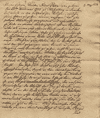 Carl Gottfried Rundt (1713-1764)
Carl Gottfried Rundt (1713-1764)

|
|
|
Sunday, August 19, 1764
2 o’clock in the morning
Carl Gottfried Rundt from the Single Brethren’s Choir, was born at Königsberg in Prussia on May 30, 1713. In the year 1727 he experienced a powerful work of the Savior in his heart at his first Holy Communion, and in the same year he applied himself to learning instrumental music. In his 18th year he joined the Infantry Regiment of the Duke of Holtein as an oboist. He remained there for 16 years and in the year 37 he was awakened through the lectures of various professor at Frederick’s College in Königsberg. From that hour on he became intent on being released from military service, which he finally accomplished in the year 46 after having had to suffer much from the regiment and others, during which time he participated in campaigns of the Prussian Army in Silesia, Moravia, Bohemia, and Saxony, where he occasionally visited Herrnhut. In the year 47 on August 8 he came to Herrnhut to stay, and was received into the congregation on October 22 of the same year. In the year 48 he was admitted to the Holy Communion on March 25, went to Herrnhaag on August 23, to Marienborn on September 16, and on the 26th of the same month was assigned to [instruction of] the children. In August 49 he moved to Lindheim in the same position, and in July 51 to Ebersdorf, where he received the assignment to go to Pennsylvania. He went by way of Barby, where the Brethren Eberhard and Bader arranged for him to go to England. On September 26 he left for New York in the company of Br. Spangenberg, Br. and Sr. Hehl, Eberhard, Bader, Kremser, and Henriette Peterman. On December 11 he arrived here in Bethlehem. In the year 52 he went with Br. Joseph [Spangenberg] to Pachgatgoch, remained there until May 22nd, returned to Bethlehem, and went in June of that same year to Gnadenhutten, where it was proposed to him and Br. David Zeisberger that they make a trip to Onandago, which they took up on the 26th of that month after the required treaty in Gnadenhütten with the Nanticokes and Shawnees. They arrived there on August 20th , but November 6th they went to Cayuga, where they were mistreated, and after one day’s stay they returned to Onondago and in December to Bethlehem. In November 53 he made a farewell trip to Pachgatgoch to which, however, he traveled again in January 54 and where he remained until the middle of May, and then returned to Bethlehem at the end of the same month. In June he went to help in Gnadenhütten, visited the Indians in Wyoming in July, and in October moved to Bethlehem again. In the year 55, in February, he went to Seatticok with Br. and Sr. Jungmann, took care of the preaching and school there for a time, was ordained as a deacon of the Brethren’s Church on August 17 at the synod in Warwick, was vicar in Lancaster from January 56 to February 58, was sent to Monocacy in April and, after the establishment of the little congregation there, returned in to Bethlehem in October. During the years 59 to 62 he was used to preach, partly in Emmaus and Lynn, partly in Maxatawny and Easton, and at the same time led the local Schreiber Collegium [group of scribes]. From June to October he made a country-preaching tour in Pennsylvania and was sent to New Jersey in February 63 in order to receive the souls there [into the church] and in June of the same year went to Philadelphia to assist Br. Neisser. At his request, in May of the year 64 he came back here to his [Single Brethren’s] choir house. He was pensive in a very quiet way and punctual in the tasks that were assigned to him, loved solitude, and took particular pleasure in his circumstance in setting the congregational texts or other celebratory material to rhyme, and he also did not lightly forego an [the words "Fest-Materien" were repeated here and then crossed out] opportunity to delight the brothers and sisters with a little song for their birthday or on other occasions. On July 31 he had to retire to the sick room because of pain in his limbs, and he spent his time there in fellowship with the Savior, often had people sing passion stanzas [i.e., hymns about Christ’s suffering] to him, and was comforted thereby with the prospect of his home-going [i.e., death]. The closer it drew near, the more aware he was of his own neediness and the unmerited grace in the blood of Jesus. On August 18th he held a comprehensive conversation with his pastor. His last words were: "Patient, merciful and compassionate is the Lord," and in this state he waited the blessed moment of his release, which took place at 2 o’clock early on the 19th in the 52nd year of his age.
Transcription and translation by Otto Dreydoppel, Jr.
